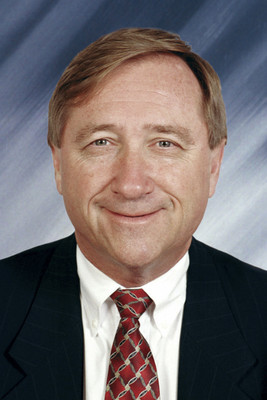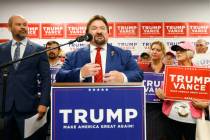Taxpayers give money; LVCVA chief gets award
When managers of a Colorado-based medical charity went looking for someone to give an award based on generosity, they found a willing recipient in the form of a top Las Vegas booster.
Given how the booster subsequently directed public money to the out-of-state charity, maybe they should have saved some gratitude for Nevada taxpayers as well.
Thanks to Rossi Ralenkotter's generosity with funds from the Las Vegas Convention and Visitors Authority, the National Jewish Medical and Research Center sold a $25,000 sponsorship to its banquet held May 10 at the Four Seasons Hotel in Las Vegas.
National Jewish is a Denver-based hospital that specializes in respiratory illnesses. It has treated 157 patients from Nevada in the past three years.
The convention and visitors authority has a $294 million budget and a mission to promote convention and leisure visits to Southern Nevada. Most of the money comes from taxes visitors pay on hotel rooms.
Ralenkotter, president and CEO of the convention and visitors authority, not only went home with the National Jewish humanitarian recognition, he also signed off on the $25,000 donation shortly after learning he was in line to receive the honor, according to public documents.
Ralenkotter isn't the first Southern Nevada public servant to receive the award. But previous honorees didn't tap the largesse of their own agencies for tens of thousands of dollars in cash, plus thousands more on travel, fine wine and scotch, veal, filet and salmon steaks at fancy restaurants for themselves and others working for the charity.
"I was trying to think of a justification for this, and I really couldn't come up with one," said Judy Nadler, senior fellow in government ethics at the Markkula Center for Applied Ethics at Santa Clara University and former mayor of Santa Clara, Calif. "It is troubling to see the coincidence, shall we say, of the lifetime achievement award going to someone who signed off on the largest donation to the organization."
The 2008 event wasn't the first time the authority supported National Jewish, but it was the most generous contribution by 10 times.
According to National Jewish spokeswoman Amy MacGregor-Hoffmann, the authority contributed to National Jewish in 1977, 1996, 1999, 2005 and 2006. The previous largest donation was $2,500.
Ralenkotter says there was nothing unusual about the 2008 donation nor the restaurant and hotel bills accompanying it.
"I have the discretion of expenditures up to $100,000. The board members gave me that discretion," Ralenkotter said.
He said the award was for the authority as a whole, not a personal honor, justifying the public expenditures.
"It is recognizing the work of the LVCVA. I'm the person who was the face and the voice of the LVCVA," said Ralenkotter, who is paid $260,166 and potential bonuses of up to $69,638 from the authority.
But other officials who have received the honor, such as Patricia Mulroy of the Southern Nevada Water Authority and Henderson Mayor James Gibson, didn't contribute to the cause with public funds.
In 2002 when National Jewish honored Gibson, Henderson taxpayers didn't pay a dime in contributions to National Jewish, city spokeswoman Kathy Blaha said.
"That was an award that the mayor received, but we did not make any type of contribution," Blaha said.
The previous year National Jewish honored Mulroy.
Water authority spokesman Scott Huntley said the district spent $2,500 to buy an ad in the event program touting water conservation, but didn't make a contribution.
"That award in 2001 was for personal purposes," Huntley said. "We do not give out any charitable gifts."
He said the water district will only purchase space in benefit banquet programs if it is used to further the mission of the agency, such as an ad promoting water conservation.
"It is ratepayer money," Huntley said. "You have to use it for purposes that are appropriate for the charging of the rates."
Julie Tousa, acting president of the Nevada Center for Public Ethics, said Ralenkotter could be criticized for loose spending, but she said his role in the fundraiser doesn't qualify as an ethical lapse.
"If their job allows them to spend a lot of money, that is, I guess, their choice. But it would be nice if government money wasn't spent frivolously," Tousa said.
The chain of events involving Ralenkotter and the medical center plays out in public documents obtained by the conservative-leaning Nevada Policy Research Institute, which counts convention authority critic and competitor Bill Weidner of Las Vegas Sands among its members.
Weidner is president and chief operating officer of Las Vegas Sands. He is a longtime critic of the convention and visitors authority, in part because he says the authority-funded Las Vegas Convention Center is using government funds to undercut privately run convention centers.
"Consider the source of these attacks," authority board chairman and Las Vegas Mayor Oscar Goodman said of the NPRI efforts. "It comes from a group of individuals who (sic) has a political agenda."
In his written statement Goodman also said: "Over the years, some of these same individuals have sued the LVCVA, attempted to block the expansion of the convention center and tried to financially cripple the organization with a state ballot initiative."
The NPRI gave the documents to the Review-Journal, which obtained further documentation and conducted interviews to substantiate the institute's conclusions that the situation raised red flags about stewardship of public funds.
NPRI Vice President Steven Miller said the organization knew its connection to Weidner would raise doubts about the objectivity of its findings and took steps to counter perceptions of bias.
"The whole project was done without his knowledge," Miller said. "He wasn't even at the particular board meeting when our trustees discussed the whole project."
Miller said the motivation behind the project was to learn more about how the authority uses public funds it receives, mostly from taxes applied to Las Vegas hotel rooms.
He said a book he read titled, "Shadow Government: The Hidden World of Public Authorities -- And How They Control over $1 Trillion of Your Money," influenced the decision to study the Las Vegas Convention and Visitors Authority.
"They are government agencies, but they get to operate like businesses," Miller said of public authorities. "That is done because they expect you will get the best of both worlds. Often you get the worst of both worlds."
NPRI hired John Dougherty, an investigative reporter from Arizona, to request public documents from the authority and compile the results.
Among the documents NPRI turned up were details behind the humanitarian honor and the authority's contribution to National Jewish.
The earliest expense is a report by Ralenkotter for $515.04 for an Aug. 1, 2007, dinner at Fleming's, a steakhouse and wine bar on West Charleston Boulevard in Las Vegas. The purpose of the dinner was to "finalize the chairmanship for the National Jewish Hospital Corporate fundraiser."
The planning dinner included two checks, one for $110.24 that covered six glasses of wine plus tax and tip. The second check for $404.80 covered dinner of ribeye, filet and tuna steaks, chocolate mousse dessert, coffee and cappuccino along with two bottles of wine priced at $66 and $54.
About two weeks later on Aug. 27, documents show National Jewish special events manager Julie Gulak sent a letter to Cathy Tull, vice president of strategic planning for the authority, notifying her that Ralenkotter would receive the award.
More bills for planning the event started cropping up shortly thereafter.
On Oct. 11, Ralenkotter submitted an expense report seeking reimbursement for $1,251.13 spent two days earlier on another lavish dinner, this time at Roy's on East Flamingo Road in Las Vegas.
The declared reason for the dinner was to discuss the committee structure and program for the National Jewish Hospital fundraiser for Las Vegas."
According to the expense report, the dinner included Ralenkotter and his wife, Mary Jo, who received the humanitarian honor with him, R&R Live President Judy Gilday Shafer, Cannery Resorts director of casino marketing Gil Cohen and his wife, banquet planning committee co-chairs Jerry and Simone Schwartz, Mary Ann Scott of the LVCVA and Karen Marano of National Jewish.
It included two $79 bottles of chardonnay, two $80 bottles of pinot noir, two scotches and several cocktails. The receipt indicates the group racked up $368.50 in booze charges, plus $39 for six bottles of water.
Ralenkotter said the expenses were justified.
"They are volunteers," he said of the group. "There were times we needed to meet after everybody's work time. It was dinner and people do have a cocktail and have some wine."
Nadler said the extravagant nature of the dinner doesn't mesh with what most people would associate with the workings of government or charity.
"Austerity is the word that we try to use when planning," Nadler said. "It does not look good to be spending money that could be going to research, in this case on an expensive meal."
The spending continued.
On April 10, 2008, Ralenkotter traveled to Denver for a tour of the hospital and to meet with National Jewish officials.
According to a July expense report, the trip cost the agency $1,504.21, including $584.26 from Denver's Ritz-Carlton, where Ralenkotter stayed.
In addition to $309 for the room, the bill included $54.37 for in-room dining and $175 under the category "Preferred Transportation."
A hotel concierge said that category typically covers transportation in a Lincoln Town Car or limousine, but can include a 15-passenger van or a "party bus."
Along with receipts, Ralenkotter included a statement reporting on the trip.
The statement was dated June 26, which was 76 days after the trip concluded on April 11, and said Ralenkotter met with National Jewish President and CEO Michael Salem and "pursued the opportunities for National Jewish to host seminars and medical meetings in Las Vegas in the future."
It didn't mention the hospital had recently honored Ralenkotter and his wife nor the $25,000 the authority spent to sponsor the award banquet.
Ralenkotter said the trip was justified under the authority's mission to attract tourism and convention business.
When asked whether the hospital has committed to doing more business in Las Vegas, Ralenkotter said: "Whenever you have a new relationship ... it takes time to cultivate leads. It takes time to cultivate the organization."
On April 28, two weeks after Jerry Schwartz accompanied Ralenkotter on the Denver trip, Ralenkotter, Schwartz and their wives met for another planning dinner.
The dinner took place at JR's Place, an Italian restaurant on South Durango Drive in Las Vegas, and cost $259.67.
In addition to entrees of veal chops, shrimp and chicken, the group drank a $65 bottle of pinot and three additional glasses of wine.
It wasn't until May 7, after the authority had committed to nearly $30,000 in expenses for the event, that anyone asked whether the spending would benefit Nevadans.
In an e-mail to Gulak of National Jewish, Sheila Christensen of the authority wrote, "Someone is asking if the money that is raised for this event stays in Nevada or Colorado?"
Seven minutes later Gulak responded, "That is a tricky answer."
Gulak wrote, "We do take care of Nevada residents and we do have subsidized care for Nevada residents."
She continued, "We don't have it all stay in Nevada as this will not give the biggest bang for the buck."
Contact reporter Benjamin Spillman at bspillman@reviewjournal.com or 702-477-3861.

















